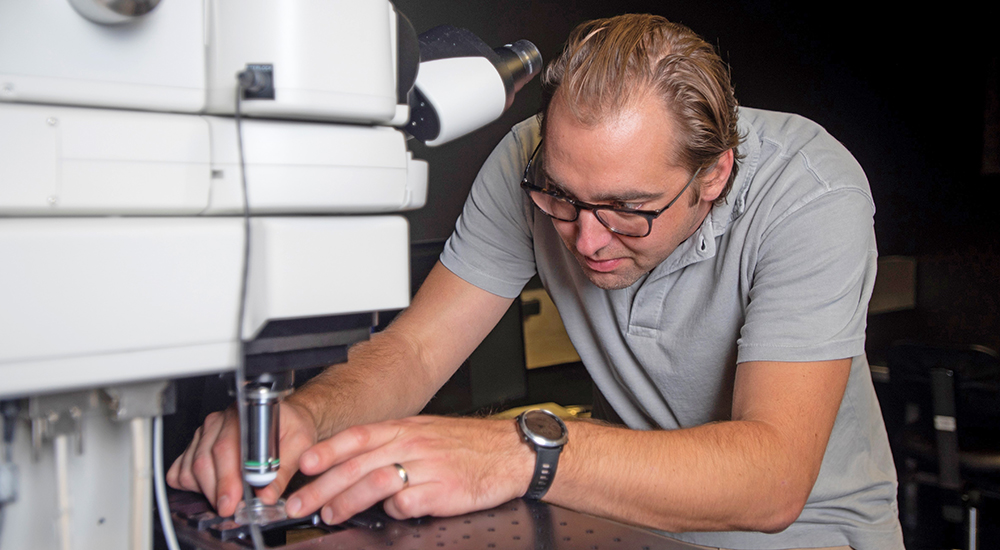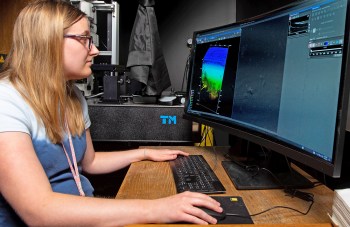Louisville VA has provided a pair of new state-of-the-art microscopes to the University of Louisville.
UofL researchers will use the microscopes to continue their close working relationship with the Clinical Research Foundation (CRF) at Robley Rex VA to understand how environmental exposures cause health effects in military Veterans.
The multiphoton confocal microscopes, valued at nearly $2 million, will help the researchers discover the mechanisms behind health effects that have been documented by Veterans and their health providers, and find ways to prevent or reduce their impact.
The new instruments provide 3D images of thicker tissue samples than were previously accessible, allowing the researchers to better see changes in biological tissues and metabolic functions in response to specific substances such as benzene and aldehydes.
Greater understanding of wartime exposure on health of Veterans
“We are exceptionally grateful to VA for providing this new technology, which will allow our researchers to have a greater understanding of the impacts and effects of wartime exposure on the health of our Veterans,” said Toni Ganzel, dean of the UofL School of Medicine. “We are pleased that the UofL School of Medicine is partnering with VA and the Clinical Research Foundation to improve care for our Veterans as well as citizens of Kentucky and beyond.”
Most imaging methods enable scientists to see only small, thin sections of tissue at a time. The images from the larger, thicker samples captured by the new multiphoton microscopes allow scientists to study the metabolic processes taking place.
“Using the system, we can look in real time at what is happening in immune cells that may be trafficking to the liver, skeletal muscle, adipose depots and the heart,” said Steven P. Jones, director of the Center for Cardiometabolic Science and professor of medicine.
The liver research, led by Matthew Cave and Craig McClain, both professors of medicine at UofL and VA physicians and researchers, will include evaluating the effects of environmental exposures on liver diseases and the metabolic syndrome. They will study interactions of environmental exposures with nutrition and alcohol intake, and investigate clinically-relevant exposures such as those related to Camp Lejeune and burn pits.
Advance VA research agenda on diseases
VA has increased this research as a result of the PACT Act, recently signed into law to help Veterans suffering negative health effects from war and peacetime exposures related to burn pits and other service-related activities.
“VA enjoys a close relationship with UofL researchers and this state-of-the-art equipment will be utilized to advance the VA research agenda, including allowing VA-affiliated researchers to apply the latest scientific methods to the investigation of respiratory, gastrointestinal, liver and metabolic diseases that commonly affect Veterans,” said Gerald Dryden, professor of medicine at the UofL School of Medicine and associate chief of staff for research and development at Robley Rex VA.
Will aid in attracting other investigators
Michael Book, CRF executive director, underscores what this investment means for the partnership in the future. “These microscopes further advance the research capabilities of the incredible investigators in our region. The equipment will aid in attracting other investigators to the groundbreaking work being done at Robley Rex VA and the University of Louisville. Beyond the technological advancement, the investment also signifies the importance of the strong relationship between the VAMC, the University of Louisville and the Clinical Research Foundation. We are excited to be a part of the innovation that lies ahead.”
Topics in this story
More Stories
Bob Jesse Award celebrates the achievements of a VA employee and a team or department that exemplifies innovative practices within VA.
The Medical Foster Home program offers Veterans an alternative to nursing homes.
Watch the Under Secretary for Health and a panel of experts discuss VA Health Connect tele-emergency care.








The relationship between the VA and medical schools and universities, and the Louisville VA and the University of Louisville is an important one and of long standing.
It is important for both parties to monitor and oversee that the gift is used for purposes also beneficial to the VA. There have been misunderstandings in decades past.